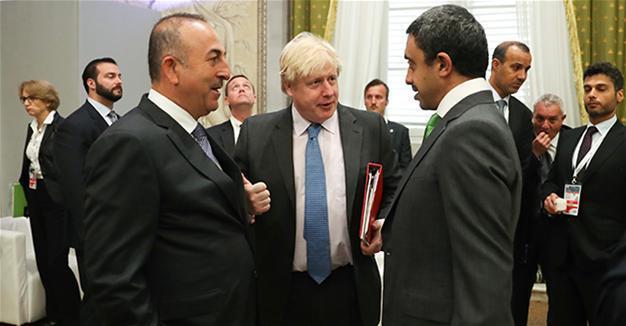Turkish FM says Syrian gov’t still has chemical weapons capacity
LUCCA, Italy

AA photo
The Syrian government still possesses a chemical weapons capacity, Turkish Foreign Minister Mevlüt Çavuşoğlu said April 11, urging measures to prevent Damascus’ potential usage of the weapons.
“According to the information at hand, the [Syrian] regime still holds … the capacity to use chemical weapons,” said Çavuşoğlu in the Italian city of Lucca on April 11 after a meeting of “like-minded countries” over Syria that was held on the sidelines of the G-7 foreign ministers summit.
Syrian President Bashar al-Assad’s government signed the Chemical Weapons Convention and agreed to turn over its chemical armaments in 2013 after being accused of a sarin attack outside Damascus that killed hundreds of people. But there have been repeated allegations of chemical weapons use by the government since then.
Recalling efforts by international organizations to rid Syria of chemical weapons, Çavuşoğlu said the Syrian government either acted dishonestly and did not turn over all of its arsenal or that the countries and terror organizations that support al-Assad supplied the regime with new weapons.
“Aside from such risks not decreasing as long as the al-Assad regime stands, [the risks] are increasing,” he said.
Apart from the G-7 countries – the United States, United Kingdom, Canada, Germany, Italy, France, Japan – Turkey, Saudi Arabia, Qatar, the United Arab Emirates and Jordan attended the meeting in Lucca on Syria.
The U.S. launched 59 tomahawk missile strikes on a Syrian air base on April 7 in response to Syria’s alleged chemical attack in Khan Sheikhoun in the northern Idlib province. While Syria and Russia deny the claims, most U.S. allies blame the Syrian regime for the attack that killed at least 86 civilians on April 4.
Meanwhile, Çavuşoğlu conducted talks over the phone on April 10, talking to four foreign ministers in one day.
Çavuşoğlu first talked to U.S. Secretary of State Rex Tillerson, during which they discussed developments in Syria, the struggle against the Islamic State of Iraq and the Levant (ISIL), the political solution process in Syria and the situation surrounding al-Assad, Foreign Ministry officials told the Hürriyet Daily News.
Çavuşoğlu later talked to Russian Foreign Minister Sergei Lavrov, who is due to meet Tillerson in Moscow on April 12 in the first face-to-face high-level meeting after the inauguration of U.S. President Donald Trump.
“Mr. Lavrov stressed that this act of aggression [the U.S. strike] was unacceptable and that it could only complicate the current tense situation and undermine Russian-Turkish efforts to resolve the Syrian crisis by diplomatic methods,” a statement issued by the Russian Foreign Ministry said.
“Both parties said there was no alternative to the current intra-Syrian negotiating process as the only option for achieving peace in the Syrian Arab Republic,” it said.
Çavuşoğlu later talked to his Iranian counterpart, Javad Zarif, over the latest developments in Syria, according to a Turkish diplomatic source.
Çavuşoğlu on April 10 also extended his condolences to Egyptian counterpart Sameh Shoukry over two ISIL attacks on churches in the country, marking a rare instance of diplomatic interaction between the two countries since relations soured after the ouster of Mohamed Morsi in 2013.
